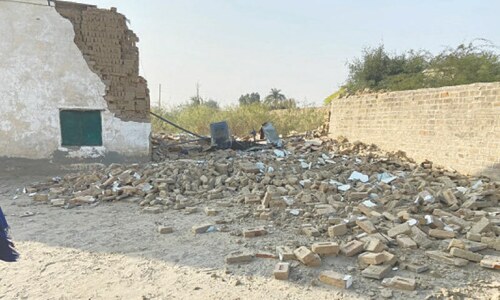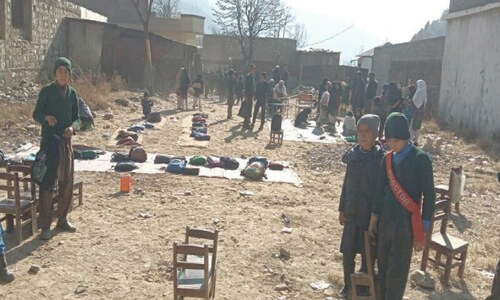HARIPUR: The state of healthcare, one of the three quantifiable dimensions to measure a district’s development, is bleak in Haripur, though the region was ranked medium high in the UNDP’s Human Development Index Report, 2017.
The report put Haripur on par with Peshawar and Abbottabad with a score of 0.700–0.799 in terms of health, education, and living standards, with their ranking barely a single point short of the high Human Development Index score of 0.800 and above.
In addition to electricity generation and distribution to the national grid from Tarbela and irrigation water storage and distribution to provinces by Haripur, the Hattar Industrial Estate in the district alone contributes Rs80 billion a year in the form of taxes.
“The state of healthcare in Haripur is deplorable; 95 per cent of the cases requiring head and chest surgeries are referred to Abbottabad and other cities,” local Jamaat-i-Islami activist Imran Alizai told Dawn.
DHQ hospital lacks doctors, machines; MS insists govt set to release funds
He said the PTI had ruled the province since 2013, but the elected MPAs, who also secured cabinet berths, diverted their energies and political acumen towards the construction of roads, buildings, street pavement, and other projects of infrastructural development just to “please their blue-eyed” contractors.
“But they [lawmakers] could hardly focus on upgrading hospitals, equipping them with state-of-the-art treatment facilities and machinery, filling vacancies for specialists, and providing better healthcare to people,” he said.
The political activist said the elected leaders preferred to visit major hospitals in other cities, so they’re oblivious to the problems of a common man.
The district has a population of 1174783 with 2.70pc annual growth rate, but it has just one 210-bed district headquarters hospital for the entire district.
Official figures show that there are no cardiothoracic surgeons or allied facilities for cardiothoracic surgeries; the posts of neurosurgeon, pathologist, and radiologist have been vacant at the hospital for over a decade.
The hospital has over 2000 OPD cases and over 200 emergency ones daily, but it has no MRI and CT scan facilities or a burns unit.
Emergences involving head and chest injuries and burn cases are referred to other hospitals. There is a high incidence of transport-induced deaths, especially in road accidents.
Official sources said there were 39 BHUs, nine RHCs, four type D hospitals each with 40 beds, and 12 community dispensaries.
The building of the Khalabat Township type C hospital has been ready for a couple of years, but due to political wrangling, the required staff has yet to be appointed to it to make it functional.
Sources said in the face of ever-increasing patient burden in the DHQ hospital and a spike of 370 per cent in the rates of hospital consumable items and a 113 per cent increase in the medicines compared to the previous year, the hospital’s budget was revised upward.
For fiscal 2022–23, the hospital’s total budget disbursed was Rs43.5 million but the next year, the government, hit by a financial crunch, released just Rs22 million.
When contacted, medical superintendent of the DHQ Hospital Dr Mohsin Raza Turabi confirmed the trauma centre, a subsidiary of the hospital, had no neuro- and cardiothoracic surgeons to treat head and chest injuries.
He added that the centre had the lowest referral rate in the province, i.e. six per cent.
”Currently, the trauma centre has 12 general medical officers working in three shifts, an emergency medical officer for the evening, two orthosurgeons, and two MOs to handle emergencies,” he said.
The MS said with the operationalisation of the 120-bed Women & Children Hospital, the type C hospital in Khalabat Township, and the type D hospitals, his hospital’s workload would reduce considerably.
He stressed the need for the establishment of a “city hospital or urban dispensary” within the premises of the Women and Children’s Hospital to improve patient care.
About the budget, Dr Turabi said the provincial government was “going” to transfer funds to the hospital after the Eid holidays to improve services.
Published in Dawn, April 14th, 2024














































Dear visitor, the comments section is undergoing an overhaul and will return soon.